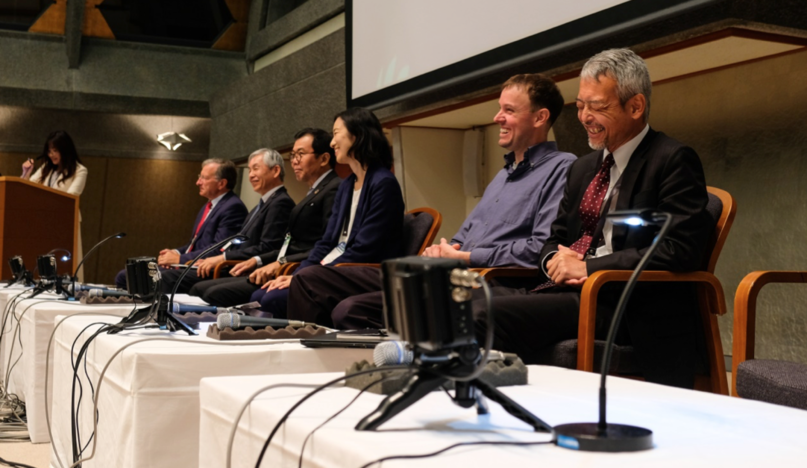Wood security vital for SDGs, says panel at Global Landscapes Forum
22 May 2019

Panelists in the discussion forum “From climate and SDG commitments to action on the ground: scaling up the contribution of forests, sustainable forest products and climate-resilient land use” at the Global Landscapes Forum in Kyoto. From left: Dr Dieterle, Dr Sawada, Mr Santoso, Dr Kanako Morita, Dr Johnson and Mr Takahiro Morita. Photo: CIFOR
The discussion, “From Climate and SDG Commitments to Action on the Ground: Scaling Up the Contribution of Forests, Sustainable Forest Products and Climate-resilient Land Use”, was held at the Global Landscapes Forum on 13 May 2019 in Kyoto, Japan.
ITTO Executive Director Dr Gerhard Dieterle said that wood security is an essential part of the global quest for a sustainable future. Productive forests, therefore, must be capable of providing sustainable supplies of wood and other forest products to satisfy increasing needs related to housing, construction, furniture, biofuels, medicines and other purposes.
If this supply is linked to sustainable and legal supply chains, said Dr Dieterle, growing global wood demand could help reduce deforestation and forest degradation by adding value to sustainable forest management and forest and landscape restoration. It could also help in achieving SDGs related to poverty alleviation, climate-change mitigation and others.
Dr Dieterle informed the audience that ITTO and other members of the Collaborative Partnership on Forests are preparing new guidelines for tropical forest and landscape restoration to not only provide guidance on implementation but also to help attract investment in forest and landscape restoration as a way of feeding sustainable supply chains.
Dr Haruo Sawada, Director General of Japan’s Forestry and Forest Products Research Institute (FFPRI), presented on FFPRI’s research and development programmes. He said that sustainable forest management enables the use of forests for various functions, with the capacity to contribute to as many as ten SDGs and associated targets, such as those related to water, carbon, timber and biodiversity.
According to Dr Sawada, interdisciplinary research collaboration is necessary for ensuring higher forest productivity and innovation in forest products.
“More comprehensive integrated research and development is essential to increase the contributions of forests, forestry and forest products to SDGs,” he said.
Dr Kanako Morita, from the United Nations University–Institute for the Advanced Study of Sustainability and FFPRI, said discussions on SDGs in the forest sector need to pay more attention to the ways in which governance can enhance forest-related outcomes. Establishing national and local initiatives on the SDGs through multistakeholder participation is crucial, she said.
Dr Brian Johnson, Research Manager at the Institute for Global Environmental Strategies (IGES), presented a case study on participatory watershed management in the Philippines. He said increasing the climate resilience of land use is an emerging need, along with capacity building for local governments to promote coordination among stakeholders.
Mr Heru Santoso, Vice Chair of the Matsushita Gobel Foundation in Indonesia, a partner of Kanematsu Corporation in Japan, reported on the Gorontalo REDD+ project incorporating cacao farming in Central Sulawesi, Indonesia. The project, which is supported by the Matsushita Gobel Foundation, is working on the development of a new value chain for chocolate markets in Japan. He said the project is contributing to poverty alleviation and environmental restoration in Central Sulawesi, with benefits for local communities and the achievement of the SDGs.
Mr Takahiro Morita, Senior Deputy Director General of the Global Environmental Department at the Japan International Cooperation Agency (JICA), presented on JICA’s work to increase the impacts of forestry in achieving the SDGs. He said the SDG targets are ambitious and societies and stakeholders, therefore, need to move away from business as usual. Thus, JICA is promoting innovation and collaboration with local and international partners. Mr Morita described a project underway in Indonesia, in partnership with the University of Kyoto, aimed at improving people’s livelihoods through the restoration of peat ecosystems damaged by fire. He said that Japanese public–private partnerships on REDD+ are playing important roles in connecting private companies, research institutions, non-governmental organizations and government ministries.
Responding to a question from the audience, Dr Dieterle said that forests and forest products have huge potential to mitigate climate change, as pointed out in the special report of the Intergovernmental Panel on Climate Change published in October 2018. A major benefit from the use of forest products, Dr Dieterle said, is in substituting for more-energy-intensive and non-renewable resources.
The panel discussion was organized by ITTO, FFPRI, JICA, IGES, the Matsushita Gobel Foundation and Kanematsu Corp.
Download the presentations here:
- Sustainable supply and consumption: from forests to markets by G. Dieterle
- Forest, forestry and forest products and SDGs: comprehensive research and development by H. Sawada
- Incorporating Forest-related Measures into Governance for SDGs by K. Morita
- Making land-use climate resilient: a participatory watershed management approach in the Philippines by B. Johnson
- The Emerald of the equator by H. Santoso, Matsushita Gobel Foundation
- SDGs and JICA by T. Morita
For further information visit the GLF site at https://events.globallandscapesforum.org/kyoto-2019/